Crucial MX200 (250GB, 500GB & 1TB) SSD Review
by Kristian Vättö on May 22, 2015 8:00 AM EST- Posted in
- Storage
- SSDs
- Crucial
- MX200
- Micron 16nm
Random Read Performance
For full details of how we conduct our Iometer tests, please refer to this article.
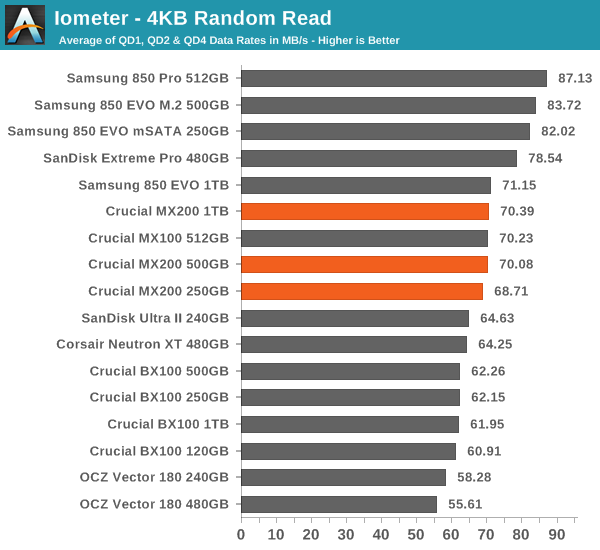
Random read performance is typical to Crucial's Marvell based drives a bit better than the BX100.
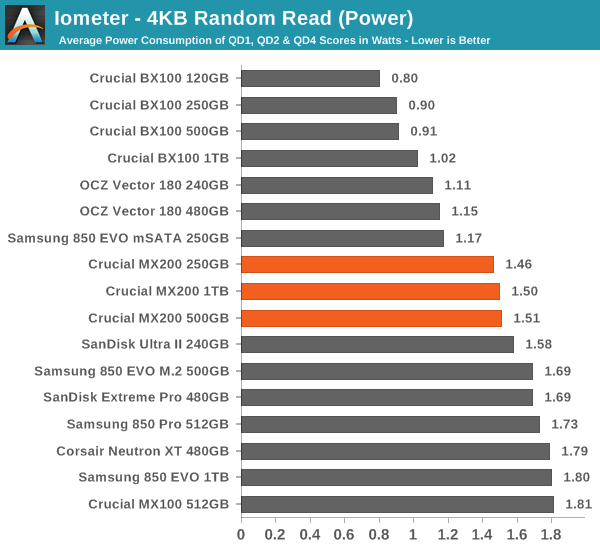
The power consumption is fairly average too, resulting in good efficiency.
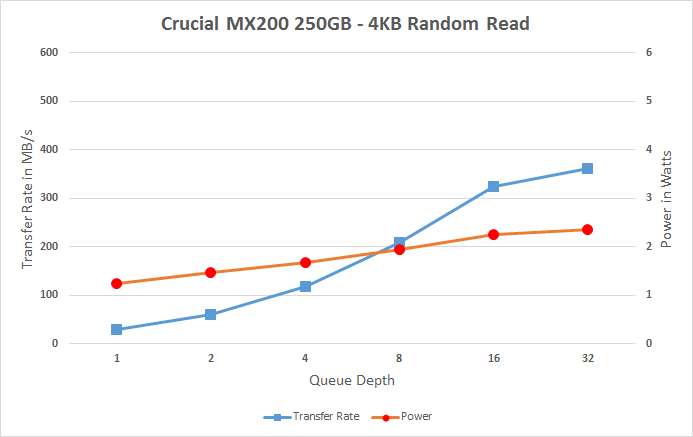 |
|||||||||
Looking at the scaling with queue depth, the performance increases smoothly across all queue depths and capacities. It's not 850 Pro level, but I suspect the NAND has its play in this too.
Random Write Performance
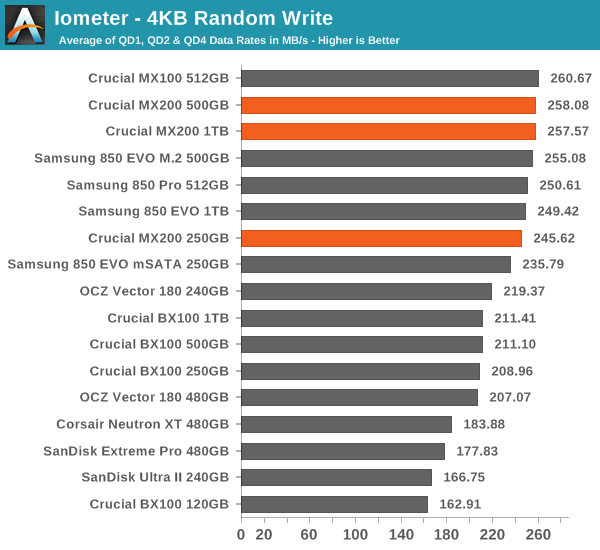
Random write performance, on the other hand, is top of the class and similar to the MX100. Crucial's Marvell based SSDs have always had excellent peak random write performance and the MX200 finally adopts the performance to steady-state too.
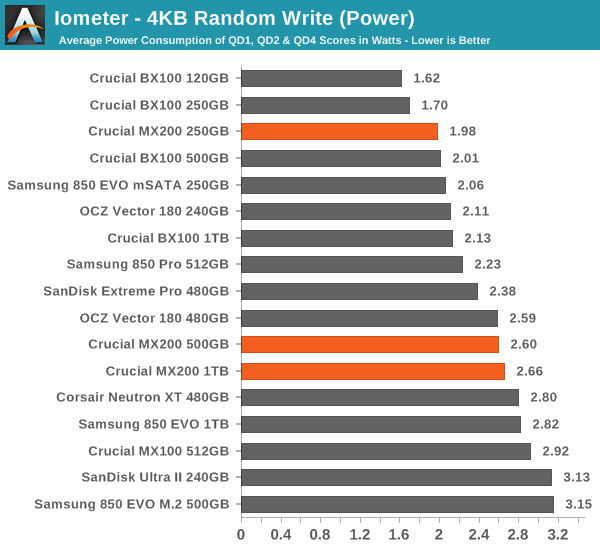
Despite the high performance, the power efficiency is good. The SLC cache in the 250GB model shows it's advantage because the performance is nearly the same, whereas power consumption is considerably lower. Writing to SLC NAND is more power efficient because each write operation requires less programming pulses to set the correct voltage state, although the downside is that the MX200 will basically rewrite all data to MLC later, which will defeat any power savings as we saw in our Storage Bench traces.
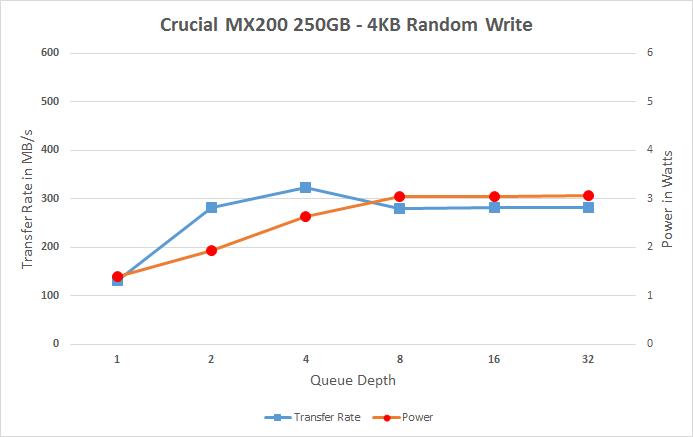 |
|||||||||
Especially QD1 and QD2 performance is great and the throughput also scales well with queue depth. The 250GB model hits the wall of its SLC cache in QD4 (half of the drive is now filled with data i.e. the whole SLC cache), so the performance takes a slight hit while the drive moves existing data from SLC to MLC and processes new write requests from the host.










62 Comments
View All Comments
beginner99 - Friday, May 22, 2015 - link
SSD market has becoming just as boring as CPU. Time for new chipste and NVMe drives which will finally deliver an actual improvement. However for clients, it doesn't really matter...even my intel G2 was good enough.JackF - Friday, May 22, 2015 - link
I continue to be happy with my 1TB Samsung EVO drive. For $359, it is/was a good value, and consistently performs high on these comparison charts.Just out of curiosity, why is the Mushkin Reactor not included on any of the comparison charts? When I was considering an upgrade, it was at the top of my list, but you never include it in the comparison charts. You gave it a Anandtech recommendation back in February?
Teknobug - Friday, May 22, 2015 - link
Sounds like what Kingston did with the SSDNow series, older SSDNow drives were fast but the newer ones are ridiculously slow, so now the same with Crucial?MrSpadge - Saturday, May 23, 2015 - link
Take another look at the BX100 - that's a really good value drive and anything but slow.jabber - Saturday, May 23, 2015 - link
The Kingston SSDs are great value as they are usually the cheapest SSDs on Amazon etc. And in most cases are probably being used to upgrade SATA II equipped hardware. In which case they will push 260MBps all day long. Seen many labour for days over SSD specs and reviews when in fact the machine they want to upgrade doesn't have SATA III.der - Friday, May 22, 2015 - link
Crucial for CRUCIAL performance. Eek!eanazag - Friday, May 22, 2015 - link
In the SSD market I only see excitement in PCIe/NVMe designs. I believe there is a place for SATA drives, but the differentiation needs to innovative; i.e. beyond performance. Warranty, reliability, consistency, software tools, and RAID support are areas for differentiation.After looking at the value & mainstream performance products in the chart the Samsung Evo is a compelling product. Crucial's BX line is a price undercutting product compared to the Evo and it doesn't do that. I say this because the BX feature set is sub-par to the Evo. The MX is the Evo's direct competitor.
KaarlisK - Friday, May 22, 2015 - link
I do not get TRIM validation. There was never doubt that TRIM works in the sense that they LBAs contain zeroes. The question always was whether TRIMming a drive would restore degraded performance. And for some drives, it would not.Why isn't this verified any more? Or have I missed something?
creed3020 - Friday, May 22, 2015 - link
Thanks so much for the review Kristian. Now I can finally compare this in Bench to others drives when making recommendations for clients.zodiacfml - Friday, May 22, 2015 - link
Price and warranty. Anyway, it is just getting more difficult to compete with Samsung which is the case and it will just get worse.